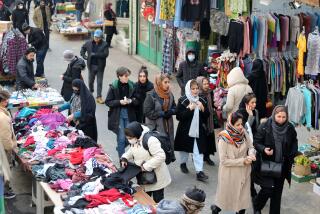Indonesia Feels Pain of Tough IMF Reforms
- Share via
JAKARTA, Indonesia — Even as riots over rising prices spread across the countryside like small brush fires, Indonesia has pushed ahead with one of its most painful but necessary reforms: dismantling monopolies.
On Sunday, the prices of eight basic foodstuffs, including sugar, cooking oil and wheat flour, were freed from cartels’ controls, and they now will be determined by the open market. Costs are expected to climb in the short term before settling down at the end of the year, economists say, making the move a risky one in a volatile time.
“It’s really the wrong time to dismantle price controls, but there’s no choice,” said Rajeev Malik, the regional economist for the investment firm Jardine Fleming. The reforms mandated by the International Monetary Fund are designed to take key industries out of the hands of monopolies mainly held by cronies of President Suharto and open them up to competition. “It had to be done, and the longer the government waited to do it, the less likely it was to happen,” Malik said.
The immediate result is fear that even basic foods will soon be out of reach for many people already struggling.
In Jember, a town in eastern Java that was hit recently by riots, a family of three watched anxiously as a shopkeeper sponged a thin film of cooking oil off the sides of a bucket and squeezed the last drops into a plastic bag. A kilo costs more than a day’s wage for most people, but the line of those waiting to buy wrapped around the market stalls. Kunti, her husband, Erwin, and their small daughter rode the bus into town at dawn from their village an hour away to buy cooking oil, and this market was the fourth place to run out.
“I don’t know what to do now,” Kunti said, her own bucket empty. “Just go back home, I guess.”
But as such scenes are repeated every day in every town across the region, frustration is erupting into violence. Groups of desperate, angry young men have stormed stores owned by ethnic Chinese shopkeepers in eastern and central Java over the past week, along a highway that leads into the nation’s second-largest city, Surabaya.
Police and soldiers have fanned out along the 60-mile strip and have arrested and detained dozens of people they say led the attacks, reported the Jakarta Post.
Some were fishermen who have had a poor season, others farmers who have been wiped out by Indonesia’s long drought. All are suffering from the currency’s plunge to less than a quarter of its value six months ago--a plunge made worse by accelerating inflation.
Things are no better in the cities. Many workers are returning from their annual holiday to find factory gates locked and their jobs gone.
On Monday, a Manpower Ministry official said manufacturers couldn’t afford a much-needed minimum-wage increase this year, leaving the lowest monthly salary at 172,000 rupiah, or, measured at the current dollar value, $16.70.
“We are caught in a double bind,” said H. S. Dillon, a director of the Center of Agricultural Policy Studies in Jakarta. “When there’s a drought and crops fail, people move to the cities to find jobs to tide them over; when there are inflation and layoffs in the cities, people fall back to the countryside to live in the villages. Now people are caught in between with no relief.”
The government fears that millions of unemployed workers will congregate in the nation’s cities and riot.
To stem urban tension, the government is creating jobs in the countryside, heavily subsidizing rice and offering one-way tickets out of Jakarta.
The World Bank is expected to unveil a special fund to stabilize commodity prices at the end of this week. But the military is on standby, and policymakers know they are dealing with a delicate balance.
“Unrest will surely happen,” said Juwono Sudarsono, vice governor of the government’s National Resilience Institute. “The police have been directed to give some leeway to protesters and let people go through that important psychological catharsis.”
But the key, he said, is that the average person feels that everyone is struggling together and not that ordinary people are suffering so others can stay rich. That was one of the aims of erasing monopolies and privileges of the president’s family and friends as part of Indonesia’s IMF-directed recovery program.
“The family must stop their spoils system,” said Sudarsono. “Their very survival rests on the tolerance and endurance of Indonesia’s poor. If they don’t put their own house in order, the tolerance will run out.”
More to Read
Sign up for Essential California
The most important California stories and recommendations in your inbox every morning.
You may occasionally receive promotional content from the Los Angeles Times.













